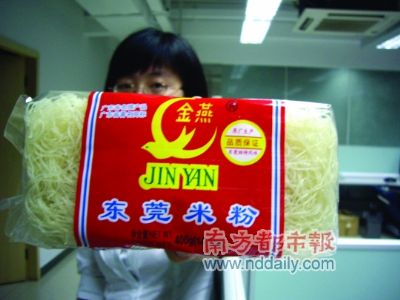
Yesterday, the reporter bought a 400g "Jinyan" brand rice noodle in Nancheng Tangbei market. Reporter Liu Zaifu
The newspaper (Reporter Hao Ying Shi Shi intern told Tingting) Greenpeace issued a report in Beijing yesterday that seven samples of rice and rice flour in Hubei, Hunan, Fujian and Guangdong were tested for genetically modified (GM) ingredients. Because the transgenic ingredient NOS is positive, this rice noodle is the famous brand of “Jinyan†rice noodles in Dongguan. The general manager of the company said: "We are different from melamine."
"On the list" rice noodles are still on sale
Yesterday afternoon, the reporter saw in the Nancheng Tangbei market that two of the four grain and oil shops in total were selling “Jinyan†rice flour. One is 400g packaged, the price is 3 yuan; the other is 7 kg boxed, priced at 20 yuan.
The owner of the shop said that “Jinyan†is a local old brand in Dongguan, and there are more than a dozen packages on the shelves. They are all new products that were introduced some time ago. The production date is February this year. The owner of another store, Miss Wang, also confirmed that because the “Jinyan†brand is better, they are selling for around RMB 0.5/kg more than other families.
In supermarkets such as Wal-Mart and Jiarong in South City, no sales of “Jinyan†rice flour have been found.
Businesses can't check every time
The staff of Dongguan Jinyan Cereals, Oils and Foodstuffs Co., Ltd. said that “Jinyan†brand rice noodles is the company’s flagship product. It has been produced and sold in China for 20 years and is a distinctive old brand in Dongguan.
For the GM component that was found to be positive, Zhu Haoquan, general manager of the company, said that the raw material of “Jinyan†rice noodles came from the Central Reserve Grain of Hengfeng County in Jiangxi Province. He said: “I have been using Hunan rice as a raw material before. Until 2006, when I heard about genetically modified things, Hunan Rice had a relatively high chance of detecting genetically modified, and she turned to Jiangxi to buy rice. The state has “three tests†for products. At the same time, we also have restrictions on transgenes when we export abroad, so we will try to avoid buying genetically modified rice."
Zhu Haoquan also talked about his opinions on "genetically modified foods." He said: "Because we are different from melamine, the good or bad of genetically modified foods is a complicated issue, and the report of Greenpeace may have a political tendency behind it. ".
“Our own investment test is very costly. For example, from December last year to February this year, we spent about 67,000 yuan on the light inspection fee. Probably tested two banks. On average, we used it for 3 months. So we did not. The method checks every batch and controls how much it controls,†said Zhu Haoquan.
Local no transgenic rice
The Dongguan City Bureau of Agriculture responded that Dongguan is not tested because it is not grown in Dongguan. If the company’s rice products are detected as genetically modified, it may be the GM rice that the company acquired in the field.
The person in charge of the Bureau of Agriculture stated: “Because China has not issued a permit for the cultivation of genetically modified rice, the company is also likely to be unaware of it. In this case, we would be very difficult to deal with it. If the company is informed to purchase genetically modified rice If so, it will be dealt with in accordance with the "Regulations on Genetically Modified Organisms," and specific penalties will be dealt with according to the circumstances of the case."
News Background
Greenpeace "Jinyan" rice flour measured genetically modified ingredients
From July 2009 to February 2010, Greenpeace purchased 43 rice samples and 37 rice flour samples in nine regions including Guangdong, Anhui, Fujian, Hubei, Hunan, Zhejiang, Jiangxi, Hainan and Hong Kong. Sent to an independent third-party testing agency for testing genetically modified components. According to test results, on July 20, 2009, NOS was positive in Jinyan Brand Dongguan Rice No. (batch number) extracted from Guangzhou Huarun Wanjia Tianhe East Store, and the transgenic strain was not determined. The manufacturer was Dongguan Jinyan Cereals, Oils and Foodstuffs. Limited company.
So far, China has not approved any kind of genetically modified staple foods to enter commercial production, and cultivation and sales are illegal. The “Jinyan†rice noodle brand is the most “bull†rice flour brand in Dongguan, not only sold in local and domestic markets, but also exported to the United States and Europe.
Laboratory Peristaltic Pumps operates by pumping fluids through the Peristaltic Pump tube squeezed rotating rollers in the pump head that squeeze the liquid out of the tube with compression force.
The peristaltic pump is a liquid delivery device that can control the flow rate. It has the characteristics of high delivery accuracy, strong corrosion-resistance, small shearing effect, simple operation, easy maintenance, and can effectively avoid cross-contamination. It has a very wide range of laboratories. Applications. From cell culture to in vitro organ research, from material preparation to water treatment technology optimization, from food ingredient extraction to food preparation technology improvement, Peristaltic Dosing Pumps may be used as power to achieve accurate fluid transmission and processing operations during the experiment.
The mechanism of this pump`s action which only delivers the liquid by the tube allows fluids to be dispensed without introducing contamination. This makes them ideal for dispensing liquids in both biological and chemical labs.Laboratory Peristaltic Pumps,Lithium Mining Peristaltic Pump,Liquid Additive Peristaltic Pump,Drugs Dispensing Peristaltic Pump
Baoding Chuangrui Precision Pump Co., Ltd. , https://www.crperistalticpump.com